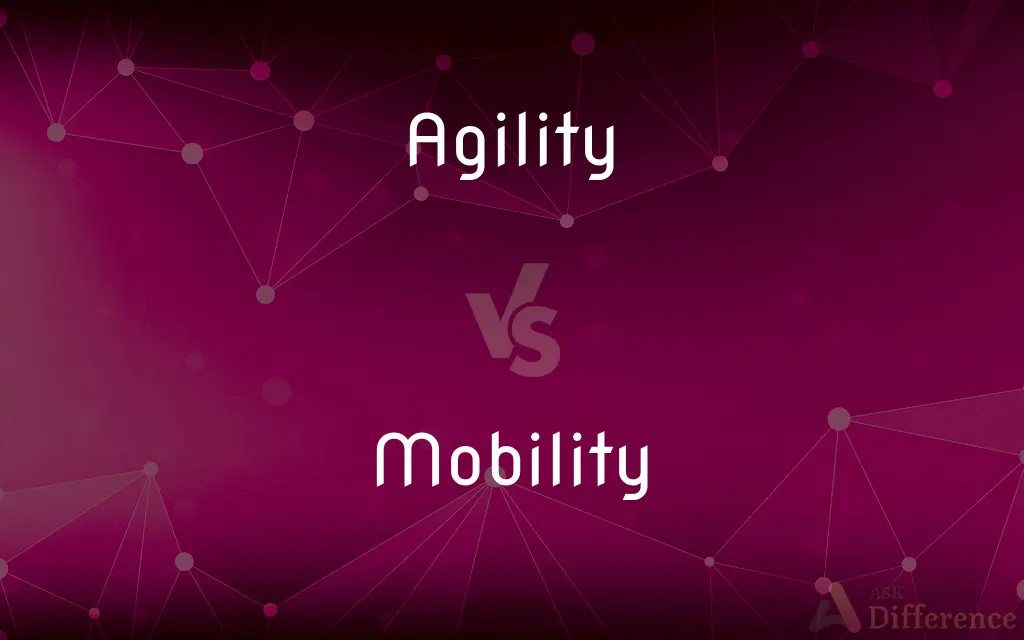Agility vs. Mobility — What's the Difference?
By Tayyaba Rehman — Updated on October 28, 2023
Agility refers to quickness, precision, and ease in movement or thought. Mobility denotes the ability to move or be moved freely and easily. While agility emphasizes nimbleness, mobility focuses on range of movement.

Difference Between Agility and Mobility
Table of Contents
ADVERTISEMENT
Key Differences
Agility is a term that often signifies rapid, controlled, and efficient movement or the ability to think and understand quickly. Whether referring to an athlete executing a complex series of movements or a business adapting to market changes, agility underscores a blend of speed and precision.
Mobility, in contrast, refers to the capability of moving or being moved. It can denote the range of motion in a joint or muscle, the ability of a person to move from place to place, or even the movement capability of systems or businesses. It underscores freedom and ease of movement rather than the quickness or precision of that movement.
Agility can be seen in contexts beyond the physical. For instance, in the world of business, agility can refer to a company's ability to rapidly adapt to market changes or unforeseen challenges, always staying a step ahead of the competition.
Mobility, while often used in a physical context, can also be applied in areas such as technology, where it might refer to mobile computing or the ability of a system to function in different environments seamlessly.
While both terms emphasize movement, the distinction lies in the nature of that movement. Agility leans towards quick, precise actions, whether mental or physical. Mobility, on the other hand, concerns the breadth, freedom, and ease of those movements.
ADVERTISEMENT
Comparison Chart
Primary Meaning
Quickness and precision in movement or thought
Ability to move or be moved freely and easily
Contexts
Physical, mental, business
Physical, technological, transportation
Emphasis
Speed and control
Range and freedom of movement
Application
Often used for athletes, fast-reacting businesses, rapid decision-making
Describes joint movement, technological devices, ability to move between places
Associated Terminology
Nimbleness, responsiveness
Flexibility, range of motion, transportability
Compare with Definitions
Agility
The capability to move quickly and easily.
The gymnast's agility was evident in her flawless routine.
Mobility
The quality of moving or being moved easily.
His injury affected his mobility, making walking difficult.
Agility
Dexterity in performing tasks.
His agility in handling the tools impressed everyone.
Mobility
Freedom of movement across different environments.
The new app offers greater mobility across devices.
Agility
The ability to think and understand swiftly.
Her agility of mind made her an excellent problem solver.
Mobility
A measure of the range of motion in a joint or muscle.
Regular stretching can enhance one's mobility.
Agility
Nimbleness in action or thought.
The agility with which he handled the situation averted a crisis.
Mobility
The ability to move between different levels in society or employment.
Education can be a key factor in social mobility.
Agility
Quickness in responding to change.
Business agility is crucial in today's fast-paced market.
Mobility
The ability of something to be moved.
The mobility of the new robot surpassed all others.
Agility
Agility or nimbleness is an ability to change the body's position efficiently, and requires the integration of isolated movement skills using a combination of balance, coordination, speed, reflexes, strength and endurance. Agility is the ability to change the direction of the body in an efficient and effective manner and to achieve this requires a combination of Balance – The ability to maintain equilibrium when stationary or moving (i.e.
Mobility
The ability to move or be moved freely and easily
This exercise helps retain mobility in the damaged joints
Agility
The state or quality of being agile; nimbleness.
Mobility
The quality or state of being mobile.
Agility
(uncountable) The quality of being agile; the power of moving the limbs quickly and easily; quickness of motion
His superior agility countered his lack of strength.
Mobility
The movement of people, as from one social group, class, or level to another
Upward mobility.
Agility
(countable) A faculty of being agile in body, mind, or figuratively.
Mobility
The ability to move; capacity for movement.
Agility
The quality of being agile; the power of moving the limbs quickly and easily; nimbleness; activity; quickness of motion; as, strength and agility of body.
They . . . trust to the agility of their wit.
Wheeling with the agility of a hawk.
Mobility
A tendency to sudden change; mutability, changeableness.
Agility
Activity; powerful agency.
The agility of the sun's fiery heat.
Mobility
(military) The ability of a military unit to move or be transported to a new position.
Agility
The gracefulness of a person or animal that is quick and nimble
Mobility
The degree to which particles of a liquid or gas are in movement.
Mobility
People's ability to move between different social levels or professional occupations.
Mobility
The quality or state of being mobile; as, the mobility of a liquid, of an army, of the populace, of features, of a muscle.
Mobility
The mob; the lower classes.
Mobility
The quality of moving freely
Common Curiosities
Is agility only related to physical activities?
No, agility can also refer to quick thinking or the ability of a business to adapt rapidly.
Is mobility the same as flexibility?
Not exactly. While both relate to movement, flexibility is about muscle elongation, and mobility concerns joint and muscle movement range.
How is agility used in a business context?
It refers to a business's ability to adapt swiftly to market changes or challenges.
Does mobility always refer to physical movement?
Mostly, but it can also denote technological adaptability or movement between societal levels.
Can an older person improve their agility?
Yes, with regular exercise and activities that challenge coordination and balance.
Can technology have mobility?
Yes, it refers to the adaptability of a system or application across different platforms or environments.
Is agility only about speed?
No, it's about speed combined with precision and control.
Is mental agility the same as intelligence?
Not necessarily. While related, mental agility emphasizes quick thinking and adaptability.
What affects personal mobility?
Factors like health, fitness, age, and access to transportation.
Can mobility be restricted?
Yes, due to factors like injury, disease, or lack of exercise.
How does mobility relate to transportation?
It can refer to the ease with which one can move from place to place.
Are agility and mobility interdependent in athletic training?
They can be. Good mobility can enhance agility, and vice versa, but they can also be trained separately.
How is mobility used in a societal context?
It can refer to the ability to move between different societal or economic levels, often termed "social mobility."
Can agility be learned?
Yes, through activities that enhance coordination, balance, and quick response.
Are agility and mobility opposites?
No, they are distinct concepts but both pertain to movement and can be complementary.
Share Your Discovery

Previous Comparison
Satire vs. Parody
Next Comparison
Midget vs. PygmyAuthor Spotlight
Written by
Tayyaba RehmanTayyaba Rehman is a distinguished writer, currently serving as a primary contributor to askdifference.com. As a researcher in semantics and etymology, Tayyaba's passion for the complexity of languages and their distinctions has found a perfect home on the platform. Tayyaba delves into the intricacies of language, distinguishing between commonly confused words and phrases, thereby providing clarity for readers worldwide.














































